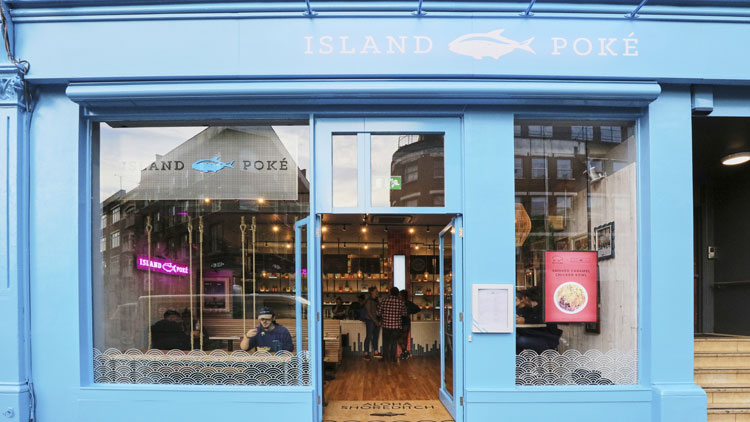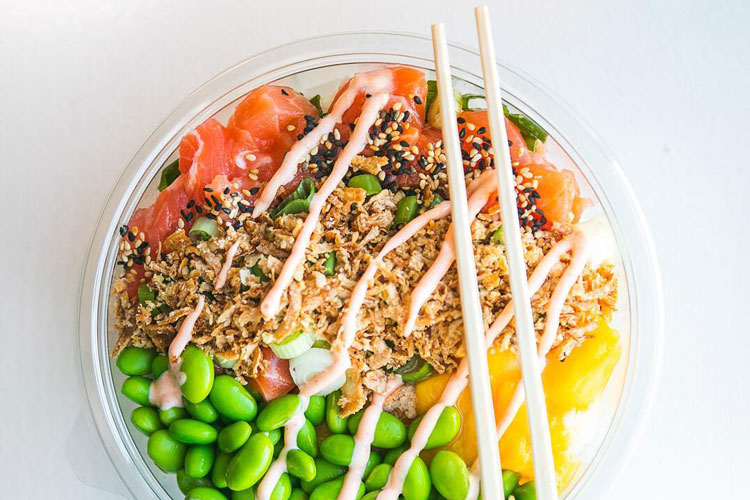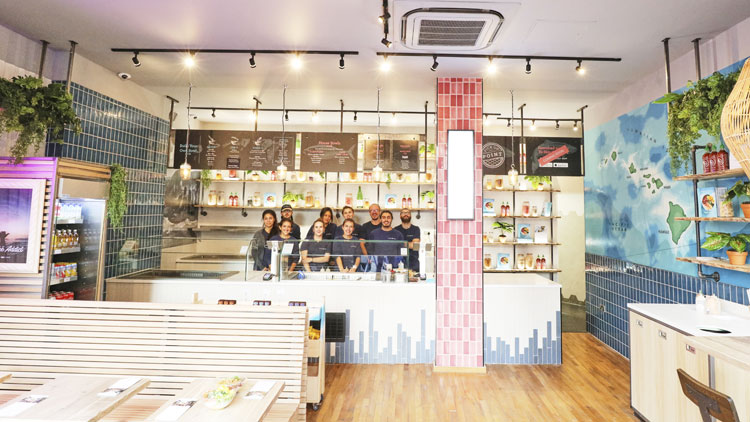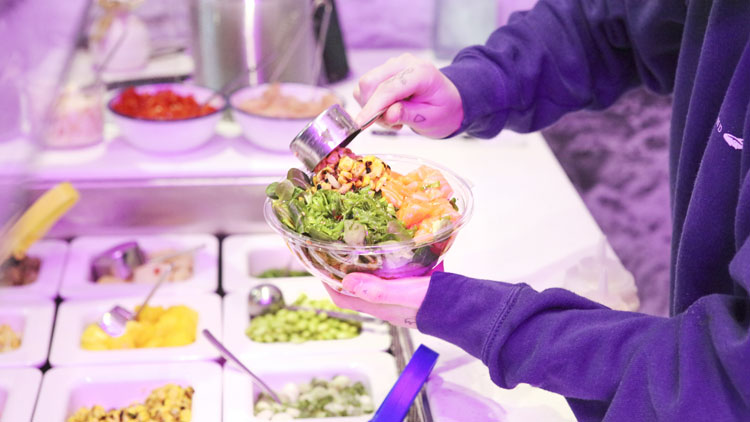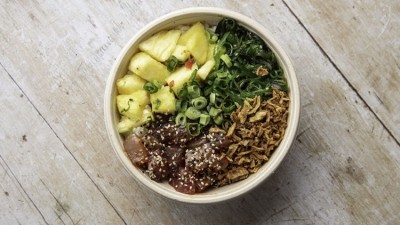Poké stakes: James Gould-Porter on his mission to change London's lunchtime
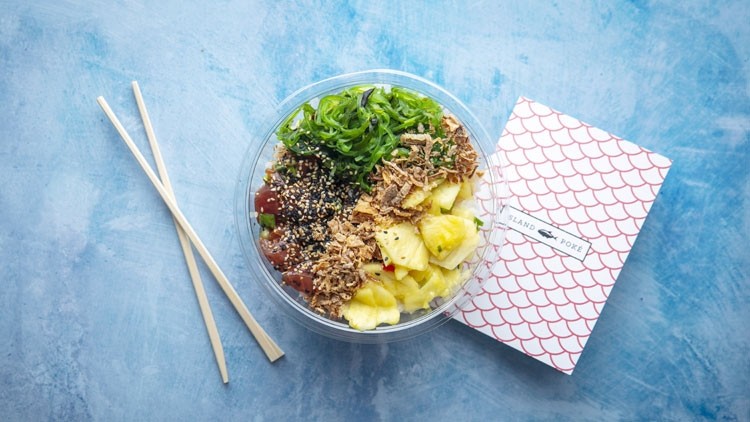
Go back a few years and hardly anyone in London had heard of poké let alone knew how to pronounce it (po-keh). From its origins as a Hawaiian snack, popularised by fishermen seasoning the off-cuts from their morning’s catch almost 50 years ago (and probably much longer in a different guise), the raw fish and rice bowl dish arrived in mainland US in around 2015, its vibrant, photogenic presentation and light and healthy qualities appealing to the country’s coastal foodies. Yet save for a one or two isolated examples, it had yet to make its mark in the UK.
James Gould-Porter, a former Bonhams auctioneer who had grown tired of the typical grab-and-go options on offer at lunch, was one of the first to see the potential for poké on these shores. Deciding to do something about it himself, he road tested the dish as a street food concept in 2015 to sense whether it had legs in rather less tropical climes. The signs were encouraging, and Gould-Porter later debuted a bricks and mortar Island Poké in Soho’s Kingly Street in 2016 in the belief that the Hawaiian dish could give its Japanese raw fish counterpart sushi a run for its money. A second restaurant followed in Broadgate Circle 10 months later.
Having been one of the trailblazers in the UK, Island Poké has been at the forefront of defining the Pacific Island-Asian fusion in London as a grab-and-go lunchtime choice. Along with the London-based Ahi Poké, which operates six sites, and Honi Poké, with its two sites, Island Poké has become a driving force for the dish, and now has six restaurants across the capital – its other sites are located in Bank, Shoreditch, Canary Wharf and Fitzrovia. And with backing from investor White Rabbit Fund there is no intention to stop at that number.
Taking on sushi
For Gould-Porter, who first tasted poké as a child on holiday in Hawaii, the dish’s success lies in its similarity to sushi but its potential to be less formal and chef-led.
“There are three main pillars of the West End lunch scene – salads, sandwiches and sushi,” he explains. “Poké is like the younger, cooler cousin of sushi – it’s less formalised, with more choice. It doesn’t require the same structure of sushi. It allows for more playfulness, more freedom.
“Sushi will always have its high-end spots, and celebrates craft and skill, whereas poké will replace it in the grab-and-go segment.”
Poké’s attraction for customers is that it gives them much greater freedom to customise dishes and choose which ingredients they want. The other bonus from an operational point of view is that, because of this, repeat custom is encouraged, with customers able to return two or three times a week and have a different option every time.
Gould-Porter has kept Island Poké’s offer simple so as to make it accessible, a particularly sensible approach when introducing people, especially those in a time-pressed lunch situation, to a new food concept. The restaurants operate an assembly line counter service where customers can build their own bowls by first choosing a base topping. For those who don’t want to be creative there are two house bowls – with either tuna or salmon .
Not only does Island Poké tick the trend for customisation, its dishes also tap into the trends for healthy eating and Instagrammability, with the various brightly coloured ingredients that make up a bowl proving to be the perfect fodder for social media. Some of its options are also vegetarian and vegan friendly – ticking more on-trend boxes.
Wider ambitions
Having grown the concept with the backing of White Rabbit Fund, Gould-Porter now has wider ambitions. These include attempting to redefine London’s lunchtime market, and evolve Island Poké into a lifestyle brand, through events, music, collaborations and retail.
“We are really trying to change the landscape of grab-and-go, and position poké as more of a genre rather than a food type,” he says. “We see poké as more of a vehicle for a style of eating – it doesn’t need to be exclusively raw fish and rice.
“We don’t want to disassociate ourselves from its Hawaiian origin – that’s the birthplace and always will be – but we’re trying to push the boundaries slightly.”
Collaborations are key to this, with poké becoming a kind of blank canvas to explore new avenues via specials. So far these have included collaborations with Scottish meat, game and seafood restaurant Mac & Wild, which included pickled seaweed and crab mayo; with Tel Aviv-inspired Southwark restaurant Bala Baya, with the creation of a pumpkin seed dukka and bitter orange glaze bowl; and White Rabbit Fund stablemate Kricket, the collaboration with the Indian restaurant group resulting in a spiced mango and Bengali pea purée poké.
Earlier this year Island Poké teamed up with Soho Nikkei restaurant Chotto Matte to create a chromotherapy food and cocktail menu that featured a series of ‘lively’ dishes using different colours. The idea was to lift spirits using the ‘healing power of colour with moodelevating ingredients’. More recently it collaborated with top US chef Nancy Silverton for another in its ‘guest bowl’ series, with a bowl of salmon, sliced new potatoes, cherry tomatoes, ciabatta croutons, capers and egg served on a bed of salad.
“We are being moulded by the food landscape of London. In my mind it’s the most exciting hotbed of food in the world,” says Gould-Porter. “To be able to pay tribute to the London restaurant scene through our offering is really exciting.”
As well as allowing Island Poké to soak up the influences of London’s vibrant food scene, the approach reduces the business’ reliance on fish, a commodity subject to price volatility in recent years.
The company’s success so far has been predicated on the quality of its fish, with its tuna exclusively linecaught, with the fishermen operating under strict regulations to ensure their vessels are both dolphin and ocean friendly. All fishing boats are chipped and monitored to avoid overfished or illegal waters. Its salmon, meanwhile, is sourced from a small co-operative farm in Norway.
As a result, Island Poké has to price itself higher than other lunchtime options – its build your own bowls are £8.85, its house bowls £7.85 – but is not prepared to compromise on quality. All its fish is sashimi grade, it uses premium Japanese rice and its ahi (yellowfin tuna) is also mercury tested and frozen to -60°c at source not only to guarantee freshness but ensure the fish is safe for raw consumption.
Back on the road
The ability to experiment and be creative is one area Gould-Porter sees as clearly setting Island Poké apart from its rivals. Perhaps counter-intuitively, going back on the road is another.
Having already put in the hard yards under street food gazebos, he recognises it is something of a regression, but sees it as a way to flex the format and explore new markets.
It is also seen as a learning exercise for potential own-brand events, which are being tested via an Island Radio playlist, the feelers for the wider lifestyle brand Gould-Porter has ambitions to further cultivate.
Another development that could serve this ambition is a soon-to-be-released consumer app, designed for click and collect.
With an interactive animated display for build your owns bowls, a loyalty scheme, offers and allergen info, the app aims to decrease Island Poké’s reliance on third-party platforms – with click and collect an increasingly important growth area for the business.
“A major focus for us has been evaluating the market and recognising there’s a definite change of scene, from conventional grab-and-go, which was based around walk-ins and people like Deliveroo and Uber Eats, to a whole load of new players like Meal Pal, At Hand, and as we’re looking to do, focus on our own app.”
This has called for a sharp focus on customer experience, such as separate queues for click and collect.
“We are lucky that our walk-in trade is up on last year – there’s still a natural interest in coming in-store. But people in London are busy, lunchtime dwell time is low, and naturally people don’t have time to spend half an hour in a queue anymore.
“We have always been very focused on the customer journey. A decent part of our business is done between 12-2pm and you can’t afford to be slouching in that busy period.”
Though known for lunchtimes, Gould-Porter points out the Canary Wharf and Shoreditch also do a strong evening trade. Despite this, there are no plans to adjust the core counter service casual approach – at least not under the Island Poké name, although he concedes a more formal dining concept is something he could consider under another name. At the moment there is certainly space for a more formal poké restaurant, with London still only home to a handful, the most notable being Black Roe in Mayfair, which launched around the same time Gould-Porter opened his first Island Poké, and Kaia at Soho House’s City spot The Ned. The latter has proven so popular with the City crowd that Soho House is considering on how to capitalise further on the trend for Asian-Pacific dining.
With rapid growth has come some growing pains, and Gould-Porter admits there will be more to come, with two forthcoming sites – Paddington and Victoria – opening in quick succession.
“We grew rapidly last year which wasn’t without its challenges and burdens. We needed to hire some sensible bodies to help assist, scale up and skill up, and find that consistency that people fell in love with on day one.”
These new recruits include Georgina Cavendish, formerly of Benito’s Hat, as finance director, and Richard Zivkovic, formerly of Abokado, Pret and Costa, as operations director – the latter position filled after 52 interviews.
The hires allow the founder to focus on product and business development, with the new and reinforced senior team aiming to nail the basics. “Right now it’s about drilling down on consistency, honing in on our DNA and safeguarding that, and writing down our company values and mission statement,” he says.
Having proven that poké is more than a passing fad, how far can Island Poké go, in London and beyond?
“There’s still so much opportunity in London, so many different pockets,” he adds. “There’s way more growth potential for Island Poké – but it’s not really about the number of sites, it’s about doing them right. There will definitely be some challenges with the next two – I’m not going to shy away from those. The combination of doing two quite close together, whereas previously we’ve had a clear gap, is going to be tough.”
On the menu
Poké is a classic Hawaiian dish of cubed, marinated fish first popularised by fishermen wanting to make an on-the-spot meal using some of their catch. The poké bowl is a modern interpretation of the dish, and typically includes a base of rice or slaw topped with seaweeds, fruit salsas, pickles and garnishes.
Island Poké offers four bases – sushi or brown rice, leafy greens and slaw – with a choice of three toppings – ahi tuna with a shoyu dressing; salmon with a yuzu dressing and roasted beetroot with chilli and lime shoyu.
Every bowl comes with spring onions and sesame seeds with the option of adding salsas – either pineapple chilli or yuzu mango – and various toppings. House toppings include wakame seaweed, edamame, toasted coconut, bonito flakes, house furikake (a mixture of dried fish, sesame seeds, chopped seaweed, sugar and salt) and kimchi. Premium toppings for an additional pound include avocado and spiced macadamia nuts, with customers also able to double their bowl’s fish content for an extra £3.50.
Build your own bowls are priced at £8.85 with Island Poké’s two house bowls – ahi tuna shoyu with sushi rice and pineapple chilli salsa; and yuzu lomi lomi with sushi rice and yuzu mango salsa and edamame a pound cheaper.
This is a web version of an article that first appeared in the May issue of Restaurant magazine, the leading title for the UK's restaurant industry. For more features, comment, interviews and in-depth analysis of the restaurant sector subscribe to Restaurant magazine here.
